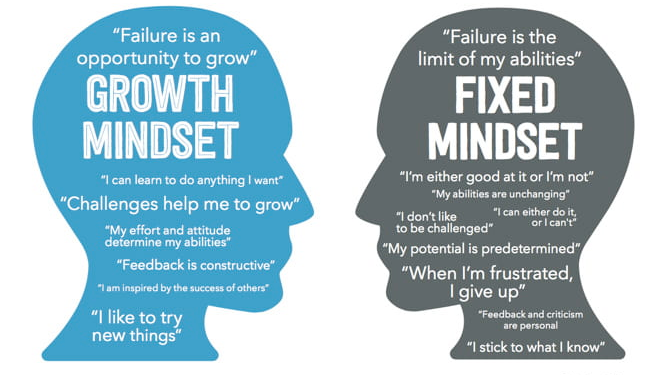Academics
Successful Test Taking!
The most important thing that I have done to be more successful in school and in taking exams is changing my mindset. There are generally two types of mindsets: a fixed mindset and a growth mindset. Many people have probably heard of these before, but taking the time to try and change into a growth mindset can be wildly helpful in your college career. See the image below for the descriptions of each. It’s easy to see how a growth mindset can be helpful!

In addition to mindset change, I also use a number of online resources. Being a student who is very deeply involved with science, it’s important to have a firm grasp on what I’m learning, because everything builds on each other! My most used resource is Chegg. A lot of people know of Chegg for its book rentals (they are VERY CHEAP!!), but Chegg also has solutions manuals to pretty much every textbook out there! It can also walk you through Sapling problems (for chemistry students), and teach you how to do them correctly! You can even post your own questions, and most of the time you can get an answer fairly quickly. This resource has been invaluable to me. While it does cost $14 per month, I justify this cost by thinking “wow, that’s really only the price of eating out at a restaurant ONE TIME each month!”.
Another resource that I use quite frequently is Khan Academy. This website is completely FREE and has video tutorials for pretty much any subject you can think of. They break things down in a way that is very simple and easy to understand. If you still don’t understand, you can also post questions on these videos as well, and again, someone usually answers pretty fast.
The last resource that I use, is called “The Homework App”. It’s an app you can download onto your phone that lets you schedule your classes, what homework assignments/exams you have when they are due, and a description of what you need to do. You can set it to send you reminders to help you stay on top of your classes. This app has saved me from forgetting things so many times. It’s so easy to become overwhelmed with college and it can be easy to fall behind. Setting reminders to do things can make sure that you are doing everything you need to be successful!
The last piece of advice I have to be a successful test-taker is to start studying WAY before you think you need to. I generally start self-testing a couple of days after I’ve gotten new information in the class. Then I continue to build onto this after each class. By self-testing, you can find out how
well you actually know the information, and you’ll have plenty of time to go in and see a tutor, your professor, or use some of the resources above!
Preparing for a Lengthy Paper
As a dedicated history major, the majority of my time is spent writing long, thought out papers that argue something about a certain aspect of the past. On the whole, my major requires me to do extensive reading because one definition for a certain historical event simply does not suffice. There is more than one side to every story. The journal articles I read throughout the course of one week reflect the volume of critical thinking any history course expects of its students. This process of critical thinking translates into the big final paper that can range anywhere from four to ten pages in length.
One of the things that I learned early on when it came to writing these kinds of papers was that they take an enormous amount of time. Simply “winging” it does not cut it. On the concept of writing a lengthy paper, Hamilton College explains that these papers operate on a “working thesis.” This means that you may have your thesis mapped out at the very beginning, but as you do more research along the way, the thesis is bound to change and evolve. Starting early allows your thesis statement to reach its full potential by the time the paper is due. Hamilton College also touches on citations and the importance of writing them out early. Trust me, making sure you have all the citation information for each article and book you use will be a handy tool when it comes to writing your bibliography. My specific major’s bibliographic format, Chicago/Turabian, takes time as well. So much so that I plan to spend the entirety of one day working on the paper just doing the citations. This is because Chicago Style requires the writer to cite information throughout the paper in footnotes (which have a format of their own), and then subsequently cite all the sources in the bibliography at the end. Not only this but knowing exactly what you have and the information contained within each source is a lifesaver.
After a year in college and with a couple dozen extensive papers under my belt, I have learned that writing out an outline saves time and lives (mine). To get to that full outline where I can simply look at it and write the whole paper then and there, I have to see everything and make connections between the numerous articles that I have collected through the research process. This is the point where I make a plan to take advantage of the library’s hours and resources. With my highlighted and annotated stack of paper, I get comfy and prepare myself for a full day of sitting in one of the study rooms, scribbling away on the whiteboard and table glass. By the end of the day, I have outlined the paper and drawn connections between my secondary and primary sources. At that point, I am ready to write the paper, because I have prepared and taken the time required to present a well-researched and thought out term paper to my professor.
https://www.hamilton.edu/academics/centers/writing/writing-resources/writing-longer-papers
How I Aced Anatomy and Physiology I & II
- If you can make the time, read through each The Amerman textbook is very readable with great graphics.
- Draw each Even if it isn’t pretty, it will help you remember and understand the big
concepts better. Draw big ideas, like the blood flow through the heart and how a neuromuscular
junction works many times.
- Glass tables and expo markers are available at the
- For remembering bones and muscles:
- Repetition is Use the models, learn from them with your list, then test yourself. Rinse and Repeat. Don’t forget to look at the cartoon pictures and study those as well.
- Find them on Recite what you can remember daily; when you’re driving to work/school/anything.
Any downtime you get, focus on one area, be it the skull, appendage, or wherever.
- When you associate them with yourself, it makes it easier to remember and easier to study.
- Use acronyms and This works especially well when you have to remember all those cranial
nerves.
- “Oh Once One Takes The Anatomy Final Very Good Vacations Are Happening” (Amerman, 2016).
- Most importantly, if you are struggling, ask for help!
- Tutors and staff can help with going over concepts, solve a problem, how to study, or even to manage your time better.
- If you have any questions the textbook doesn’t answer or you can’t find them, don’t be afraid to go to your They’ll be excited that you want to understand the mechanisms in more depth.
- There are many layers to learning everything in A&P and you could take an entire course for each chapter at a four-year university.
Human Anatomy & Physiology by Erin C. Amerman, 2016. Florida State College at Jacksonville. ISBM 13: 978-0-321-99061-7
Test Taking Skills
Before a test listen carefully to the teacher’s last-minute instructions and review the relevant information. Going through the test, it is important to look for information pertinent to some questions in other questions. Answer the questions you know and leave the ones you don’t for later. Be sure to read the questions carefully (this has tripped me up before). If you notice yourself getting so panicked you can’t think, or taking too long on one question, take a short breather and check back on the question when you feel calmer (remember, you got this!). Be sure to keep an eye on the time as well. Don’t be afraid to ask the instructor for clarification on questions. If you absolutely don’t know the answer (and its multiple choice), I was once told that C is the most common right answer, if C seems wrong go for the longest answer. Picking an answer is better than leaving the question blank. Do a quick check over all the questions before turning in the test.
https://ssd.umich.edu/article/strengthening-test-taking-skills
Study Skills
One of the most important parts of taking a test is checking the answers marked wrong when the test is returned to you, this is the most valuable information you can glean from it. This tells you what to study more. Look at each of the questions marked and note why they are marked wrong, ask your instructor if needed. Before you take a test, try to get some idea of what the teacher expects you to know (try looking at previous tests, does the teacher provide a study guide, what is emphasized in class?) Once you have identified what you need to study (before or after a test) be sure to record the information in a way that makes sense to you. Reword things in a way that you understand and will remember. Try to identify how you learn (does it help to color code your notes or draw diagrams?) Try designate study time and minimize distractions during this time. Try to study well before the test and not cram the night before. Self-testing can be effective.
https://www.lynchburg.edu/academics/tutoring-academic-support/top-10-study-skills/
Studying for a Microbiology Test
In class
- Attend every day of class and take good
- Go to class with a good night's sleep so you can
- Keep off your phone at all times during
- Be engaged in conversations and willing to answer
Outside of class
- Review the notes you went over in class that same day so you always stay caught
- Begin going over the study guide at least a week before taking the
- Get a partner and question each other over the information you will be tested
- Briefly go through all study guide questions to get a feel for what all you need to
- Then thoroughly go through each problem multiple times to make sure you completely understand each question.
- Take a little break for every 20 minutes of
- Go in and talk to Dickerson on any key information needed for the test.
- Don’t be afraid to Google any topics you are struggling to understand using your
- One source I personally use is Khan Academy. khanacademy.org
Test Taking
By doing as much studying as possible for a Microbiology test I have found that it thoroughly relieves my anxiety about taking the test. The times I am most anxious are when I have not studied enough and do not feel confident. To decrease your anxiety, study harder. But if you do find yourself to be anxious I find that just focusing on breathing deeply for an extended period of time can take my mind off the test and lessen my anxiety.
Tips for Test Taking
For a variety of reasons, there are some students who struggle with tests, whether it be from test anxiety, a lack of organization, or poor studying habits. There are many tips and suggestions out there to help with all of these. Just attending class on a regular basis will greatly help improve your understanding of the material. But don’t just show up; make sure that you are listening, paying attention, taking notes, and asking questions about things you might not have a full understanding of. After class, take some time to reorganize your notes and gather up the information in a sensible fashion; this will help you to know what you do and what you don’t understand.
As far as studying goes, only study in 40-50 minute increments, then take a 10-15 minute break. This will help stop you from becoming too overwhelmed, as well as help you retain information that you just studied. Also, create or be in an environment meant specifically for studying; this will help reduce distractions and get you right down to business. If you know that there is a big test or exam coming up, don’t wait until the night before to study. Start studying at least a week before; this will help you clarify things you do not understand, as well as give you confidence that you know the answers, which will help reduce any anxiety that you may feel.
Before taking a test, if you are feeling especially anxious, create a worst-case and best-case scenario. This will help you highlight your goals, and can help reduce the anxiety, because honestly if you end up failing a test, the worst-case scenario won’t leave you dead. It
may only cause you to have to retake the course. When taking the test, go through and answer all the questions that you are confident about. Place a star next to any of the questions that you don’t know or are unsure of, and come back to it. By using this method, it helps to boost your confidence as well as point out any material that you may have overlooked while studying. Also, use the test on the test; oftentimes, there will be a question that provides an answer to a previous question, so make sure to look out for those.
And finally, if you know that there are going to be many vocabulary questions, or you just need some memorization help, using a site called Quizlet is very useful. You can create your own flashcards, or search for a set using keywords, like the name of a chapter in a book. There are also lots of options for studying on this site, including a matching game and spelling test, and there is an option to generate a test, which includes fill-in-the-blank, multiple-choice, and matching. It will also grade you and help you figure out the areas that need some extra work.
Sources: https://quizlet.com/ and the UW Four Rules of Success Handout
How to Prep for an Exam
When a troubled student comes to me and asks me how to prepare for an exam, I happily inform them that there are a few steps to accomplish this task. Coming from personal experience, the first thing that I do is look for a study guide/study review in my personal Moodle page under my specific class that the exam is for. If there is not one given, ask the professor if they are willing to construct one. The majority of instructors are really good about producing a study guide.
Once you have a study guide, take some time to go through the questions. This is really good to contrast between the notes that you take in class and the study guide. If there are no quality notes (notes that do not answer the questions on the study guide), or if you missed notes because you were not in class that day, ask a friend in class to see if you can have their notes. If notes are not in “the cards,” then go through the material for your class. By material I mean power points, your book, handouts, or anything else the professor provides during class.
Tips I also recommend are of the following: before getting started, find music that makes you happy. We want to be in a good mood and motivated. Once you have your study guide in front of you, write all the questions on a separate piece of paper, then answer them. Even write little helpful hints that you can associate with that answer from that question. Make sure that you get a hand on colorful highlighters, color code everything! Writing and colors really help with the intake of information. Take twenty minutes on/off-breaks. You don’t want to overwhelm your brain where you can not function. Have a dancing party in between. The last tip I would give is to be very repetitive. Go over the questions and answers from the front and back, mix them up, and have someone test you on your questions.
For subjects like math and chemistry, I use Chegg. Chegg is a website that will help you with any subject. It is great because you can post questions that you are having trouble and within 10 to 20 minutes there is someone who sends you a picture of step by step instructions to answer that question. Though, you do have to pay $14 dollars a month for it. That is the only downside.
I also like to listen to ted talks. If you are looking for a paper to write or to get any ideas on research. Go to TED talks!! https://www.ted.com/?205SHm
Studying for a Test
Studying for a test can be hard. Especially if there’s a lot of material that your professor covered. If your professor provides a study guide, use it. Read through the study guide, and then take a break. The last thing you want to do is overload your brain with too much information.
Another thing you can do is turn your vocabulary into flashcards. This helps with your memory and allows you to picture the words as well. Studying at night can help, but studying the day of the test helps you even more. You can start by studying the night before your test and then get a good night’s sleep. Then you can wake up in the morning and start studying again. Try to study a couple of hours before, an hour before, and a little right before the test. Doing this will help the information stay fresh in your mind and easier to remember. Studying a couple of days before the test will also help you to remember the information, so each day your brain remembers more and more.
https://www.princetonreview.com/college-advice/how-to-study-for-a-test
Preparation for Writing a Paper
Here are my tips for preparing for a paper.
- Have a strong thesis.
- Your thesis is the basis for your entire If your thesis is garbage, your paper is garbage.
- Make sure your thesis represents what you
- A strong thesis is over an arguable
- Smoking and chewing tobacco age should be increased to 21 because 18-year-olds don’t quite understand the inherent health risks associated with tobacco.
- This thesis takes a side on an argument that can be argued well on both
- Develop your first paragraph and second paragraph
- These paragraphs are similar, but they can act as “roadmaps” for your body
- Your first paragraph will be the largest paragraph of the entire paper, and should easily be about a full page (For assignments that are more than one page).
- Your closing paragraph will be similar to your first paragraph, however, your closing paragraph will be a summary of your first paragraph.
- Your closing paragraph should contain your arguments, your thesis, and a closing statement (closing statement can be your thesis if you so wish).
- Each body paragraph should be different.
- Body paragraphs should each talk about their own respective
- Your body paragraphs should start with a strong sentence (no: first, second, then, lastly).
- Only change paragraphs when the idea changes. No need to spread the same argument/idea over multiple paragraphs (this also helps keep your paper organized).
Good Websites for Help with Writing:
Purdue OWL – A website I use all the time. Mostly for citations, but there is help for how to start your paper, how to write a resume, etc.
https://owl.purdue.edu/owl/purdue_owl.html
The Library Guides and Tools: Northwest College’s library has some well-written help pages associated with the various types of styles (APA, MLA, Chicago) as well as tutorials on how to use gowyld and the differences between various types of information you might find.


